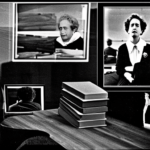Summary:
In “Booth,” author David Robertson explores the life and legacy of John Wilkes Booth, the man responsible for assassinating President Abraham Lincoln. Through meticulous research and engaging storytelling, Robertson delves into Booth’s upbringing, his motivations for the assassination, and the aftermath of his actions. This comprehensive account sheds light on the complex character of Booth and the impact his act had on American history.
The Early Years and Influences
Robertson begins by delving into Booth’s early life, tracing his family’s theatrical background and his own rise to fame as an actor. Booth’s upbringing in a divided America, with a father who sympathized with the Confederacy, played a significant role in shaping his political beliefs and fueling his desire to take action against the Union.
Booth’s exposure to radical ideologies and his association with the Confederate cause further solidified his commitment to the Southern cause. His encounters with prominent Confederate figures, such as John Surratt and Jefferson Davis, provided him with a network of like-minded individuals who shared his disdain for the Union.
The Assassination Plot
The book meticulously details Booth’s meticulous planning and execution of the assassination plot against President Lincoln. Robertson explores the various individuals involved in the conspiracy, including George Atzerodt and Lewis Powell, and their roles in Booth’s plan.
From the initial plan to kidnap the president to the eventual decision to assassinate him, Booth’s determination and audacity are evident. The author provides a vivid account of the events leading up to the fateful night at Ford’s Theatre, where Booth shot Lincoln in the back of the head, forever altering the course of American history.
The Aftermath and Legacy
Following the assassination, Booth’s escape and subsequent capture are recounted in gripping detail. Robertson explores the public’s reaction to Lincoln’s death and the nationwide manhunt for Booth and his co-conspirators. The author also delves into the trial and execution of those involved, shedding light on the legal proceedings and the public sentiment surrounding the case.
The book concludes with an examination of Booth’s lasting impact on American history and the legacy he left behind. Robertson explores the conspiracy theories that emerged in the aftermath of the assassination and the enduring fascination with Booth’s life and motivations.
- Key Takeaways:
- John Wilkes Booth’s upbringing and exposure to radical ideologies shaped his political beliefs and fueled his desire to take action against the Union.
- The meticulous planning and execution of the assassination plot against President Lincoln showcased Booth’s determination and audacity.
- The aftermath of the assassination, including Booth’s escape, capture, and the trial of the conspirators, had a profound impact on American history.
“The assassination of President Lincoln by John Wilkes Booth remains one of the most significant events in American history, forever altering the course of the nation.”
In “Booth,” David Robertson provides readers with a comprehensive and captivating account of the life and actions of John Wilkes Booth. Through meticulous research and engaging storytelling, the author sheds light on the complex character of Booth, his motivations for the assassination, and the lasting impact of his actions. This book is a must-read for anyone interested in American history and the individuals who shaped it.












